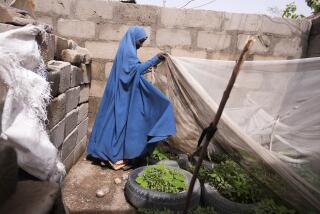What Kind of Society Keeps Its Children in Poverty?
- Share via
We are seeing an extraordinary celebration of freedom in Europe. With breathtaking swiftness, we are witnessing the emergence of a new world. As my heart thrills to this burst of new life, I am called to assess the state of freedom--and the state of children--in my own country.
I guarantee you, no East German family in pursuit of liberty would wisely go to Main and Fifth streets in Los Angeles. Nothing inhibits expression, action, movement and personal freedom more than oppressive and grinding poverty. Nothing so impoverishes a person as a deficient education.
Most shocking of all is the way the burden of this poverty makes captives of our children. In California, the richest state in the nation, the poor go to bed hungry, if they are lucky enough to have a bed. After the staggering amounts we spend to defend ourselves externally, there isn’t enough left over to feed the ones we’re defending internally--to help give them decent shelter, decent schools, decent care when they’re sick and old.
A serious measure of a society is how it treats its children. By that standard America is in deep trouble. The United States may be the first society in history where children are worse off than adults. Children are now 40% of the nation’s poor--25% of everyone under the age of 18 lives in poverty. Have we created a society that doesn’t love children?
W. C. Fields once remarked cynically, “Anyone who hates children and dogs can’t be all bad.” That used to be funny because it wasn’t true. But today we have created a society where children are abused and neglected, and where the “throw-away child” has become a walking social catastrophe in our time.
In June, 1989, California received a grade of D for its services to the state’s 7.6 million children, in a report prepared by Children Now, a nonpartisan group of distinguished Californians.
The picture is grim. One out of five children in California lives in poverty. Half the state’s 2-year-olds have not been fully immunized against communicative diseases.
Education is a well-documented disaster, with one-third of all students dropping out of high school before graduation--and for blacks the figure reaches 48%, for Latinos, 45%. These bleak figures will worsen when the impact of Gov. George Deukmejian’s $25-million cut in family-planning services hits the families of our state.
What we’ve allowed to happen to our children is scandalous. It grieves the heart of God. A society in which children are the poorest citizens loses every claim to greatness. As citizens of this rich state, we can change that if we choose.
The Greeks had a saying: “There will be no justice in Athens until the uninjured parties are as indignant as the injured parties.” In 1990 my deepest hope is that we commit ourselves to be advocates for those who have no voice, to create a society worthy of our children.
More to Read
Sign up for Essential California
The most important California stories and recommendations in your inbox every morning.
You may occasionally receive promotional content from the Los Angeles Times.










